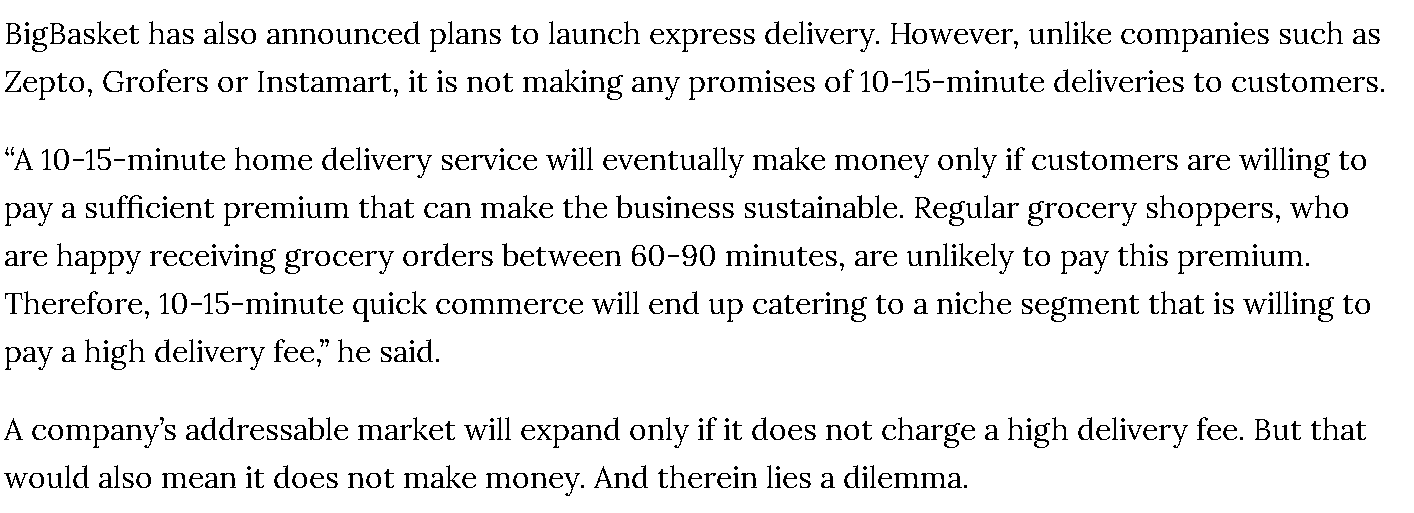For twitter thread: link
Startup culture craze has been going on for a few years all over the world now. Especially among college students who believe that quitting the job and building a random business is COOL. My observation is that many of them are just interested in raising money from private equity and come into the limelight.
The problem with this Startup culture is that it creates a delusion in the eyes of the young generation (college students like me). Students just want to get the feel of this startup culture and want to write “CEO/Founder” on their Instagram bio.
But reality is far away.
Raising equity is not the end, rather it’s the start of your hectic lifestyle where the vultures (Private Equity Funds) would force you to grow aggressively and kick the thoughts about profitability outside the window.
Today I came across this news article titled: “Meet the 19-year old Stanford dropouts building Zepto and delivering groceries in 10 minutes” and thought of sharing my personal views.
Note: The following is going to be a critique of Zepto’s business model via use of Moneycontrol’s article under fair dealing provision of the Copyright Act, 1957 section 52(1)(a)(ii) which allows use of material for criticism.
The interview portraits these founders as if they have done something truly novel and never thought of. This makes the news sell or link clicked. This provides fake inspiration to students to drop out of formal education and pursue random business ideas.
I would suggest to track such business in the long run by looking at their balance sheet and not what valuation they are raising money at. Raising money is a risky model where if the plug is pulled you are dead. Here is thread by Prof. Sanjay Bakshi which explain this concept: link
The article itself provides the serious problem in their business model:
It’s a very small player in the industry which made it to the limelight because they have raised money from quite famous PE funds, one of which I admire Y Combinator.


They do not reveal the number of stores they have nor the daily orders but as sources have hinted, they are a very small player in the industry which will create false hopes in the reader’s mind - by believing that their business model has succeeded.
Statement by BigBasket’s management:

I personally don’t feel Zepto’s business model is solving any huge problem. Most of the items they provide to deliver will be available at your KIRANA store, that means just around the corner.
Some people do monthly groceries, some do weekly, and the segment of customers who would be willing to pay heavy fees for this type of service already have domestic help at home who do the shopping for groceries.
One biggest threat in their business model is that if the big boys want, they could kill their business overnight by just making this as a feature. Actually, the big boys have already started this. Players like Swiggy (instamart), Dunzo, Zomato, Grofers, etc. have the required industry experience and just by tweaking their model a bit they have brought Zepto’s whole business model as a feature. Zepto’s future kind of looks like what Microsoft did with internet browsers.
As I mentioned about pulling the plug above, one of the big boys even raised money from the public market. Imagine how tough the competition is going to be.

I understand it is difficult for someone to praise their competitor but BigBasket’s management point actually makes sense to me. Zepto is getting into a very niche segment which can be catered by big players by just some tweaks. Their customer would be someone who forgot to do their groceries + doesn’t care about extra fee + needs it urgently. Rarely do these scenarios play together.

Combination of artificial intelligence and machine learning? I doubt they can really use that tech on a customer base of 8,000-10,000 daily orders. Plus, what’s stopping the big boys to do the same? Rather the big boys would bring in an IITian and give them equity.
“the company claims its cost is much lower than the industry average of Rs 40-50 to deliver one product” This statement is a clear case of sampling bias.
Of course by delivering only 1/10th of the size of orders compared to industry players your cost will be the lowest in industry. I can run one person company with only one customer and claim my cost to be zero and way below industry average.
Finally the interview also provides an insight from a person who works at a investment fund:

Even the Private Equity people know that it doesn’t look sustainable but these guys are ready to put in 0.000001% of their worth, which could be a smart bet.
Inshort
Sustainability should be a priority rather than just raising private equity money and giving out interviews. The success rate of startups is extremely low and students should not get attracted to starting a startup just to raise private equity and give out interviews. Entrepreneurship is not that easy as the media portraits it to be. Most businesses don’t survive.
Disclaimer: I do not hold any grudge against any person/company mentioned in the post. This was written for educational purposes.